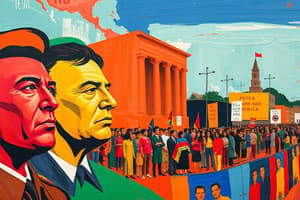Podcast
Questions and Answers
रिनेसांस क्या होता है?
रिनेसांस क्या होता है?
- एक राजनैतिक आंदोलन
- एक वैज्ञानिक संगठन
- एक धार्मिक धारा
- एक महत्वपूर्ण युग (correct)
कर्ल वस्पुस किस क्षेत्र से सम्बंधित थे?
कर्ल वस्पुस किस क्षेत्र से सम्बंधित थे?
- कला (correct)
- धर्म
- विज्ञान
- समाजशास्त्र
पहली विश्व युद्ध में कई मौतें कैसे हुईं?
पहली विश्व युद्ध में कई मौतें कैसे हुईं?
- पाकिस्तान के हमले से
- प्राचीन युद्ध
- पुलिस से चलने वाले हमलों से
- एटॉमिक बम की वर्षा से (correct)
संवैधानिकता का सम्बंध किसके साथ होता है?
संवैधानिकता का सम्बंध किसके साथ होता है?
अंतिम विश्व युद्ध को किसने प्रारंभ किया?
अंतिम विश्व युद्ध को किसने प्रारंभ किया?
सम्राट की महत्वपूर्णता कहाँ थी?
सम्राट की महत्वपूर्णता कहाँ थी?
कोल्ड वॉर के दौरान क्या सही था?
कोल्ड वॉर के दौरान क्या सही था?
मिश्र ने क्या महत्वपूर्ण योगदान दिया?
मिश्र ने क्या महत्वपूर्ण योगदान दिया?
कौन-कौन से प्रमुख सुपरपावरें थे, जो कोल्ड वॉर में संघर्ष कर रहे थे?
कौन-कौन से प्रमुख सुपरपावरें थे, जो कोल्ड वॉर में संघर्ष कर रहे थे?
प्राचीन सभ्यता मेसोपोटेमिनस की महत्वपूर्णता क्या है?
प्राचीन सभ्यता मेसोपोटेमिनस की महत्वपूर्णता क्या है?
कोल्ड वॉर के समय क्या हुआ?
कोल्ड वॉर के समय क्या हुआ?
'नकली' हस्ताक््््््््््््््््््््््️िल' का 'कोल््् ्््' है:
'नकली' हस्ताक््््््््््््््््््््््️िल' का 'कोल््् ्््' है:
Flashcards are hidden until you start studying
Study Notes
Exploring Human History
As we delve into the rich tapestry of human experience, it becomes essential to understand the significant events and periods that have shaped our collective past. In this exploration of history, we'll journey through the Cold War, ancient civilizations, the Renaissance, the World Wars, and the era of colonialism.
The Cold War (1947-1991)
The Cold War was a period of tension and rivalry between the Soviet Union and the United States. This global political, economic, and military conflict spanned nearly half a century and had profound implications for world affairs. The two superpowers were ideological rivals, each advocating for their respective political and economic systems—Communism and Capitalism. The Cold War brought about the expansion of nuclear weapons, the establishment of alliances (NATO and the Warsaw Pact), and the constant threat of potential conflict. The fall of the Berlin Wall in 1989 and the dissolution of the Soviet Union in 1991 marked the formal end of the Cold War.
Ancient Civilizations
The ancient world teemed with vibrant civilizations, each having distinct cultures, languages, and technologies. Notable among these are the Egyptians, who built the iconic pyramids and developed a unique writing system. The Mesopotamians, who dwelled in the fertile lands between the Tigris and Euphrates rivers and gave rise to the world's first cities, writing systems, and organized religions. The Greeks, who laid the foundations of Western philosophy, science, and democracy. And the Romans, who built an expansive empire across Europe, North Africa, and the Middle East, uniting diverse peoples and cultures. These ancient civilizations left enduring legacies that continue to shape our understanding of the world today.
The Renaissance (14th-17th Century)
The Renaissance was a period of great cultural and intellectual rebirth, which began in Italy in the late Middle Ages. The Renaissance, meaning "rebirth," brought forth a renewed interest in classical Greek and Roman literature, art, and science. There was a revival of humanism, a philosophical movement that emphasized the centrality of human beings, and a revival of interest in the natural world. This period of flourishing culture birthed some of history's most celebrated artists, musicians, poets, and scientists, including da Vinci, Michelangelo, Galileo Galilei, and William Shakespeare. The Renaissance extended its influence across Europe and beyond.
World Wars (1914-1945)
The 20th century was marked by two devastating global conflicts—World War I and World War II. The former, often referred to as the Great War, began in 1914 as a result of various geopolitical tensions in Europe. It ended in 1918, leaving millions dead and devastated lands in its wake. The latter, World War II, began with the invasion of Poland in 1939 and was fueled by the rise of fascism and militarism across the globe. World War II saw the use of new, horrifying weapons like the atomic bomb and resulted in the deaths of over 70 million people. Both wars had profound effects on global politics, economics, and society.
Colonialism (15th-20th Century)
Colonialism was a period of European exploration, conquest, and settlement of foreign lands. During this time, European nations established colonies in Africa, Asia, and the Americas. The colonial era brought about profound changes in the world, including the spread of Western culture, the introduction of new technologies, and the alteration of existing political systems. However, colonialism also had negative consequences, including the exploitation and marginalization of indigenous peoples, the uprooting of traditional cultures, and the spread of diseases. The end of colonialism in the 20th century was marked by the rise of nationalism, decolonization movements, and the emergence of new independent nations.
Understanding the complex history of the human race requires an appreciation for the multifaceted events, phenomena, and people that have shaped the world in which we live. By delving into the Cold War, ancient civilizations, the Renaissance, World Wars, and colonialism, we gain a clearer perspective on the origins, evolution, and consequences of human history.
Studying That Suits You
Use AI to generate personalized quizzes and flashcards to suit your learning preferences.




